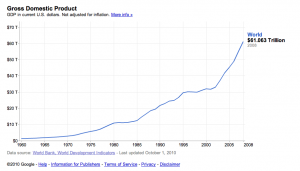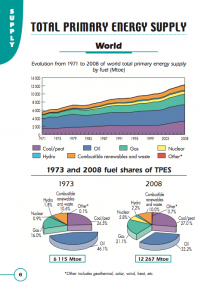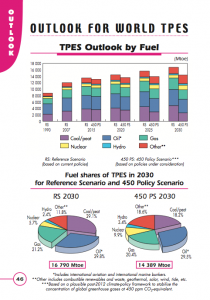Green Capitalism: Fix or Folly?
The present economic and climate crises have increased pressures on international and individual governments to act. The solutions to these problems are seen within the walls formed by discourses [1] of neoliberalism, the economic growth paradigm and technological optimism. These discourses are essential gears in the oil guzzling capitalist machine.
As solutions to the aforementioned crises, we are told that arctic and oil sand development, electric cars, and carbon trading markets are the solutions to our environmental and economic woes (as if they were separate things). We are told that capitalism can be ‘green’.
Read the rest of this article here:
https://blogs.ubc.ca/landscapesofenergy/green-capitalism-fix-or-folly/
December 16, 2010 No Comments
Discourse and Lifestyle Politics
We have covered the problems of economics, politics and technology in mitigating the degrading and violent geographies of energy extraction, distribution and consumption. It is absolutely necessary discuss what taxes, laws and engineering will be needed to create solutions to our energy, social and environmental problems. However what is missing from much of these debates is the cultural attitudes which covertly normalize solutions and ideals of any future policies.
November 30, 2010 No Comments
Pictures of the port tour
November 24, 2010 1 Comment
TED talk by Tim Jackson worth checking out
November 17, 2010 No Comments
Some interesting videos on steady state economics
http://steadystate.org/learn/leeds2010/videos/
November 17, 2010 No Comments
Capitalism's Foul: Obstructing a Transition to Renewable Energy and Human Equity
Energy and wealth distribution are accomplished by a system of social relations and production called capitalism. However, the allocation of this wealth and energy supply has created problems; climate change, postcolonial unrest, and poverty should cause us to stop and think about the system that got us here. If we accept that all knowledge is political, that someone somewhere, created the institutions of capitalism for a purpose, we should not withhold scrutiny; especially at this critical juncture in human history where the future demands bonafide institutions which can meet the task of changing our energy system and restoring equity to our world.
I would like to discuss briefly the obstacles embedded within this capitalist system which may impede this transition.
Subtracting fossil fuel from the capitalist equation is one of these obstacles. Capitalism harnessed fossil energy during the eighteenth century to fuel its expansion. Fossil fuels enabled rapid expansion of trade and markets over the globe; augmented exponentially the amount of work human bodies can accomplish, and generated a great deal of wealth for capitalist nations and individuals.(1) Finding a substitute with these magical qualities is the first challenge we face if we want to continue with present rates of economic growth and increasing global consumption.
However even if we were to discover a new source of abundant energy to replace fossil fuels there are contradictions and political motives within capitalism which must be addressed before we speak of the mechanics of a new energy system, or social order.
The first contradiction is between production by capitalists and consumption by labour. Capitalists want to maximize profits which means paying the lowest wages possible. However, these wages must be carefully measured to ensure an adequate level of consumption by labour; because when there is not enough people, and money, to buy all the stuff we have a crisis of overproduction and underconsumption. Then, a crisis, people lose their jobs, as we saw during the Great Depression in the 1920s and the US mortgage crisis in 2009.
The second contradiction in capitalism is, the tendency of firms to shift the costs of pollution onto the health of labour and the environment; these costs are then born by individuals and the state as pollution cleanup and health care bills. However, this crafty maneuver catches up with capitalists because in the long run pollution hinders the productivity of labour and land which lowers the profit rate, not to mention making people quite irate!(1) These two contradictions will cripple solutions to our energy and poverty crisis if left untouched.
Another obstacle is the possibility that the present capitalist system requires an uneven geography of energy use and wealth. If this is true, than any future attempt to level out the use of energy and wealth will necessarily fail unless this systemic flaw is corrected. The present arrangement of global capitalism is enabled by ample cheap labour; two billion souls living outside the formal economy are feeding the industrial cities of the global south with cheap and plentiful labour for free, i.e. it does not require wages paid by capitalists to reproduce itself; instead, renewable energy from biomass, like dung and wood, is used to nourish this population instead of money wages. Their day-to-day existence is provided by the toils of their labour and that of their animals.(2) For many reasons these people living hand to mouth leave their rural subsistence lifestyles for the promising light of the city and the wages available there which are needed to survive in a global cash economy. Herein lies the problem; if this population of two billion peasants are brought in to the formal economy and their standard of living raised, as we are told will happen as the “rising tide” of economic growth “floats all boats”(4), who will form the army of cheap labour necessary to achieve a ‘sustainable’ profit rate?(3) We have seen rapid deindustrialization in the developed industrial nations over the last 40 years as firms moved production away from organized and high cost labour towards these cheap labour supplies to boost profit rates. However high profit rates depend on keeping wages low and keeping the commodities used to sustain the labour force cheap. Without cheap labour, profit rates fall, and commodities rise in price forcing up wages even more.
The implication of a necessary underclass of flexible, cheap labour is that it is opposed to the goal of transitioning to renewable energy and human development. Constructing a new energy system and reducing poverty and inequality under the current capitalist system means increasing wages and transitioning to renewable energy sources. If wages rise too much in these traditionally poor industrial areas, profit rates fall. Renewable energy must provide energy at the same price as fossil fuels to maintain profit rates. If renewable energy is more expensive, this too will strangle profits.
So challenges exist beyond the technical task of rewiring our society with windmills and solar panels. First, fossil fuels are the darling of capitalism. They enable the explosive nature of capitalist development fueling innovation, transportation and production at breakneck speed. Breaking this habit will be tough given the good times it has provided. In addition, the contradictions inherent in capitalism are being constantly managed with each consecutive crisis. Capital is always seeking the cheapest labour and the lowest wages while simultaneously seeking to raise consumption levels. This only works when there is wide range of income levels. When everyone gets paid what they are worth there is no margin left for profits. The other contradiction is that cheap goods and services depend on offloading the costs of producing these goods onto some peripheral environment and population. If everyone starts speaking up there will be no backyards left to dump the refuse of production. The final problem is more specifically political and stems from these contradiction: Our species of capitalism rests on inequality; inequality which allows fabulous wealth to be created at reckless speed but only for the lucky few. What to do? Well, that’s up to me and you.
Notes
(1) Huber, T. “Energizing historical materialism: Fossil fuels, space and the capitalist mode of production.” Geoforum 40, (2008): 105-115.
(2) Abramsky Koyla. “Chapter 5: Energy, Work, and social reproduction in the world-economy” in Sparking a Worldwide Energy Revolution. Edited by Koyla Abramsky, AK Press, Oakland, CA, 2010. pp. 98-99.
(3) O’Connor, James. “Is Sustainable Capitalism Possible?” in Natural Causes. Guilford Press: New York, NY, 1998.
(4) This is the status quo strategy to improve the well being of the global poor. As economic growth increases global production of goods and services, and thus global prosperity, so too will the poor prosper by induction into the formal capitalist economy.
October 25, 2010 No Comments
VIFF film and interesting article
How was the film? I was too tired to make it. I just stumbled across an interesting article by Lester Brown.
http://www.earth-policy.org/images/uploads/book_files/pb4book.pdf
October 15, 2010 No Comments
Fossil Fuel and the Future of Energy Under Capitalism
I’m writing this essay partly in response to lectures by Stewart Brand and the Green Party. I’d like to speak about these lectures in relation to what we have read so far about capitalism, oil sands, arctic energy exploration and the implications for our future energy supply under a capitalist system.
Stewart Brand – Technology!
If I could summarize Stewart Brand’s lecture it would be like this: Climate change is serious and we have very little time to transition into a carbon neutral economy. The best path forward is to encourage more and faster urbanization, education and reproductive rights for women, accelerated genetic engineering of crops, bioengineering, nuclear power expansion right now with potential for fusion power to come online in the next few decades and geo engineering if necessary. In short, we need to accelerate advances in technology, economic growth and our energy infrastructure. I’ll refer back to these ideas later in reference to our readings.(1)
Green Party – Stop!
The Green Party suggested about the exact opposite stressing the Limits to Growth.(7) Their argument is that economic and population growth are the essential problems because each year our economy grows at the exponential rate of about 3% and consumes a comparative increase in material inputs like oil, water and topsoil. This consumption is an overburden to the ecosystems which support us through services like the hydrological, nutrient and carbon cycles. The only solution is to shrink our economies and population which will effect a decline in material consumption to reduce the burden on our the ecosystems.
This Limits to Growth argument rests on the premise that human activity exceeds the carrying capacity of our planet. Humans are not different than any other species which surpasses its environmental limits; If they surpass the natural limits their population will eventually crash. This should cause us concern for if our material throughput (i.e. stuff we take from the earth) and economic growth continues. In figure 1 one we see a steady exponential increase in gross domestic product (GDP), i.e. the final monetary value of combined goods and services produced, which serves as standard measure of economic growth. The graph shows a rough increase of an average of 3% increase in GDP per year. At this rate our economy will grow 3.3 times bigger over the next 40 years. In Figure 1 we see our economy was recently (2008) sitting at 61 trillion dollars. If we extrapolate that number at 3% to 2050 our economy will producing over 200 trillion dollars. The logic goes that we will also be consuming proportionally more resources, which we can’t afford to do because we already surpassed our carrying capacity decades ago. Technology is not a solution because all this new energy technology will only perpetuate business as usual economic growth, material consumption and carbon emissions. Increasing efficacy provided by technology will only decrease the intensity of material usage but not change the fact that we will still use more resources each year albeit at perhaps at a rate below 3%. The point is that it doesn’t matter how efficient our economy is if it requires more resources per unit output of GDP each year. According to this view is,the solution to stopping environmental degradation and ensuring human survival is, we don’t have a choice, we have to shrink our economies and our population by halting growth.
Mirage
My sinking feeling after hearing these lectures is that business as usual, i.e. the current formation of capitalism, and technological advance proposed by Stewart Brand is a flawed solution. It will not provide us with a solution to climate change soon enough. Not because we don’t have the technology to produce fancy new power plants, and grains, but because it will take too long and too much fossil energy to reconstruct our infrastructure for everything. New cities, buildings, vehicles, power grids and power plants will have to be rebuilt using fossil energy to transform our economy into a CO2 neutral/negative economy. Below in Figure 2 and 3 are graphs from a 2010 International Energy Agency report which shows our past and future energy supply. These graphs show that fossil fuels, oil, coal and gas have risen in use historically. Figure 3 below shows a steady increase of fossil fuel use up to 2030 with renewables making up less than half our power source at best. While certainly not set in stone, we could be emitting more carbon in the future than we are today if economic growth continues, and we have already emitted too much.
Capitalism Loves Oil
While I love the whiz bang! gadgets produced by capitalism’s wonderful capacity for innovation I feel it is not the best solution in its present form. Capitalism relies on technological change and competitive advantages in production and marketing which to date has only increasing our use on fossil energy at the very time we need to start shutting down every last fossil fuel power plant and internal combustion engine (Again see figures 2 and 3). Huber’s argument in “Energizing Historical Materialism” makes a strong case that fossil fuels are internal to the metabolism of capitalism. According to Huber, fossil energy is internal to contemporary capitalism for these reasons:
1) Fossil energy replaces human energy which decreases demand for labour and increases supply. This decreases the control of labour over the production process because there are proportionally less workers employed by each firm and by increasing the labour supply there is steady leverage against resistance because there are many more labourers to replace the resistors.
2) The ease of transportation allows concentration into cities where they can be consumed by industry and consumers.
3) Energy density and abundance have allowed increased velocities of production and time to market which in turn increases profit rates.
The problem then for any future energy source is that it will have to replicate these characteristics without a pause to sustain continued economic growth. This is then a major obstacle to stopping CO2 emissions and reducing our material consumption.
Oil Ho!
Present enthusiasm to exploit Canada’s Tar Sands and Arctic oil reserves seems natural given capitalism’s love of oil.
If we were serious about stopping CO2 emissions we would be limiting our exploitation of the Tar Sands. Yet I see no sign of a decrease in exploitation. For example Tar Sands development is a central policy of the Security and Prosperity Partnership signed by North America governments (SPP). (4) Alberta’s oil fields are the world’s largest remaining oil reserves and have attracted almost 60% of global oil investment.(4) Moreover neither Canada nor Alberta have indicated any intention to stop the total exhaustion of this resource.(4)
Similar to the Tar Sands, the Arctic is seeing vigorous investment by energy companies and energy states such as Russia. The Russians are betting on Arctic energy to fuel their future economic growth and imperial ambitions. They planted a flag beneath the North Pole on the sea bed hoping to prove that the sea floor is an extension of the Russian landmass so they can explore fossil energy deposits.(5) The Russian state owned enterprise (SOE), Gazprom, is the largest gas extractor in the world. Russia now ranks third behind Iran and Saudi Arabia for the oil and gas reserves. This would support the evidence offered by the IEA energy forecast that fossil energy is not going away anytime soon.(5)
Sounds kind of grim really. I think realistically the solutions to reduce human impacts on the earth lies somewhere in between Stewart Brand’s and ‘Limits to Growth’ arguments; We need some technological innovation and we need to seriously consider halting economic growth, at least in the developed world. Of course things may turn out quite differently than any of us can imagine. However, I don’t think that mainstream political and business leaders or society for that matter are being intellectually honest or listening to the predictions of the consequences of a business as usual future. I know there is debate over how many people the earth can support, but it would be prudent to guess on the conservative side. It’s easier to grow later than be forced to shrink after it’s too late. The friction to change our behavior is only natural because any serious reduction in energy consumption of the system is likely to the power of elites and sacrifice the high quality of life we in the developed world feel entitled to. However things may turn out, it remains to be seen how tolerant the earth’s biosphere and atmosphere are to the endless growth ideology that is capitalism and its insatiable appetite for fossil fuel.
Bibliography
(1) The ideas of Stewart Brand can be found in his new book: Whole Earth Discipline: an ecopragmatist manifesto (London: Atlantic Books, 2010)
(2) www.google.com, “global gdp”.
(3) Huber, T. “Energizing historical materialism: Fossil fuels, space and the capitalist mode of production.” Geoforum 40, (2008): 105-115
(4) Nikiforuk, Andrew. Tar Sands: Dirty Oil and the Future of a Continent (2008). p. 2
(5) Sheppard, Lola and White, Mason. “Meltdown: Thawing Geographies in the Arctic”. pp. 133-134
(6) International Energy Agency, “Key World Energy Statistics 2010”. http://www.iea.org/.
(7) Meadows, Donella. The Limits to Growth. New York: Universe Books, 1972.
October 15, 2010 1 Comment
Another interesting article re. efficiency
http://www.fastcompany.com/1583947/peak-oil-new-urbanism-biofuels-solazyme
October 13, 2010 No Comments
Myth of a techno fix?
Here’s a link to Jevon’s Paradox. Anyone from economics studied this? Seems like a sobering perspective on the so called technological fix to reducing our consumption or rate of consumption of material resources.
http://en.wikipedia.org/wiki/Jevon%27s_paradox
October 8, 2010 1 Comment



